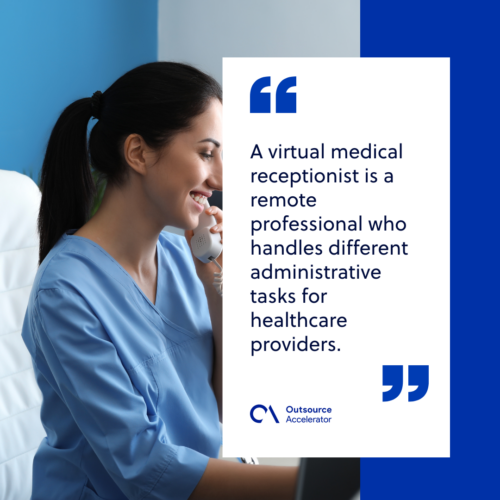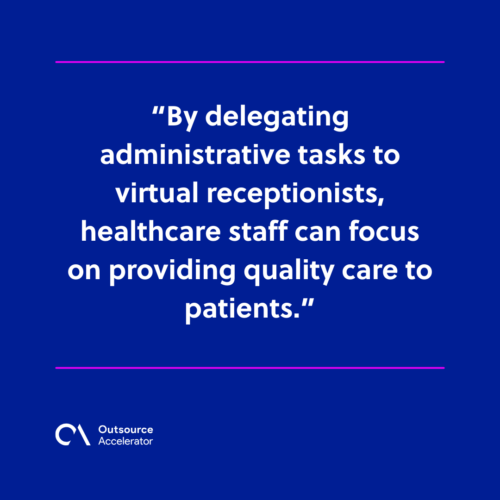Outsourcing a virtual medical receptionist: A quick overview

Gone are the days when patients would call or visit a clinic only to be greeted by an overworked in-house receptionist juggling multiple tasks.
Today, virtual medical receptionists are stepping in to revolutionize the way healthcare providers manage administrative duties and patient interactions.
These skilled professionals, operating remotely, bring a unique blend of efficiency and empathy, ensuring that patient inquiries are handled promptly and with care.
As the healthcare industry increasingly embraces outsourcing, virtual medical receptionists have become indispensable.
This article explores the unique benefits and contributions of virtual medical receptionists in healthcare outsourcing. We’ll uncover how this innovative role transforms the way healthcare organizations operate.
What is a virtual medical receptionist?
A virtual medical receptionist is a remote professional who handles different administrative tasks for healthcare providers. This role is similar to that of an in-house receptionists but operates from a different location.

Despite not being physically present, virtual medical receptionists are still able to provide personalized, efficient, and secure customer service to patients.
They frequently utilize advanced technologies like:
- AI-powered chatbots
- Voice recognition systems
- Telephony software
These specialists are often employed through outsourcing companies or virtual assistant services. They provide healthcare practices with a cost-effective and flexible solution.
Benefits of outsourcing a virtual medical receptionist
Embracing the capabilities of a virtual medical receptionist can bring numerous benefits to your healthcare practice.
These benefits include:
1. Enhanced efficiency
Virtual medical receptionists can handle a high volume of tasks simultaneously. These include:
- Appointment scheduling
- Call screening
- Patient inquiries
- Insurance claims processing
This efficiency translates to faster response times, reduced wait times, and streamlined administrative processes in healthcare facilities.
2. Cost savings and resource optimization
By outsourcing a virtual medical receptionist, healthcare organizations can save on overhead costs. These costs frequently inflate due to the need to hire and train in-house staff, which isn’t a problem with outsourcing.
Additionally, virtual medical receptionists offer more flexible payment structures. Organizations only pay for services on an as-needed basis.
3. Improved patient service
Virtual medical receptionists provide personalized and professional customer service to patients through various communication channels, including phone, messaging, and email.
Prompt and attentive service reduces wait times and ensures that concerns are addressed swiftly and professionally. This level of attention and care enhances the overall patient experience and increases patient satisfaction levels.
4. 24/7 availability
Virtual medical receptionists can operate outside of regular business hours. This enables your organization to provide round-the-clock support to patients.
24/7 availability ensures that patient needs are met outside of regular office hours, providing continuous support and increasing patient access to services.
5. Scalability and flexibility
As a healthcare practice grows or experiences fluctuations in patient volume, virtual medical receptionist services can easily scale up or down.
This adaptability allows practices to manage changes in demand without the challenges of hiring, training, and maintaining a larger in-house staff.
6. Data security and compliance
Virtual medical receptionists are trained to handle sensitive patient information securely and comply with healthcare regulations. This ensures that patient data remains confidential and protected, reducing the risk of privacy breaches.
7. Reduced administrative burden
By delegating administrative tasks to virtual receptionists, healthcare staff can focus on providing quality care to patients. They’ll avoid getting bogged down by scheduling, phone calls, and other front desk responsibilities.
This alleviation of administrative burden can lead to a more efficient and productive work environment.

Considerations when outsourcing a virtual medical receptionist
When outsourcing a virtual medical receptionist, you should aim to create an arrangement that aligns with your healthcare organization’s objectives and patient care standards.
Use these considerations to guide the selection and collaboration with a virtual medical receptionist:
Security and privacy
One of the primary concerns in healthcare outsourcing is ensuring that patient data is protected.
Check whether a service provider adheres to stringent data security protocols and complies with regulations such as the Health Insurance Portability and Accountability Act (HIPAA).
Verify if the virtual receptionist service has robust security measures like encrypted communication channels and reliable access controls to protect sensitive patient information.
Quality of service and communication
Prioritize providers with a proven track record of delivering high-quality receptionist services in the healthcare industry.
Look for case studies, client testimonials, or industry certifications that demonstrate the provider’s ability to offer professional, empathetic, and accurate patient interactions.
Establish clear communication protocols and procedures with the virtual medical receptionist service. Ensure that they understand your healthcare facility’s protocols for handling emergency calls, routing calls to on-call staff, and following specific instructions for patient inquiries.
Training and expertise
Even with experienced virtual receptionists, training is crucial to align them with your practice’s specific protocols, patient care standards, and communication style.
Establish a comprehensive onboarding process to familiarize them with your practice’s culture, expectations, and unique patient demographics.
Integration with existing systems
Seamless integration with existing healthcare management systems and processes is vital for efficient operations.
Check whether the virtual receptionists can easily work with your electronic health record (EHR) systems, appointment scheduling software, and other administrative tools.
Compatibility ensures smooth workflows and reduces the risk of miscommunication or errors.

Cultural and language considerations
Depending on the location of the virtual medical receptionist, cultural and language differences may affect patient interactions.
Alternatively, your patient population may be diverse, so you should verify that the virtual medical receptionists can accommodate language preferences and cultural sensitivities.
They must be able to communicate with a wide range of patients effectively.
It’s important to choose a provider whose staff can speak your patients’ primary languages and understand cultural nuances that may impact patient care.
Customization and personalization
Consider the level of customization and personalization offered by the virtual receptionist service.
It must align with your healthcare organization’s specific needs and communication preferences so you can maintain a seamless patient experience and reinforce your brand image.
Patient experience and personal touch
While virtual receptionists can handle many administrative tasks, maintaining a personal touch in patient interactions is crucial.
Ensure that the virtual receptionists are trained to provide compassionate and personalized service, as this can significantly influence patient loyalty and satisfaction.







 Independent
Independent




